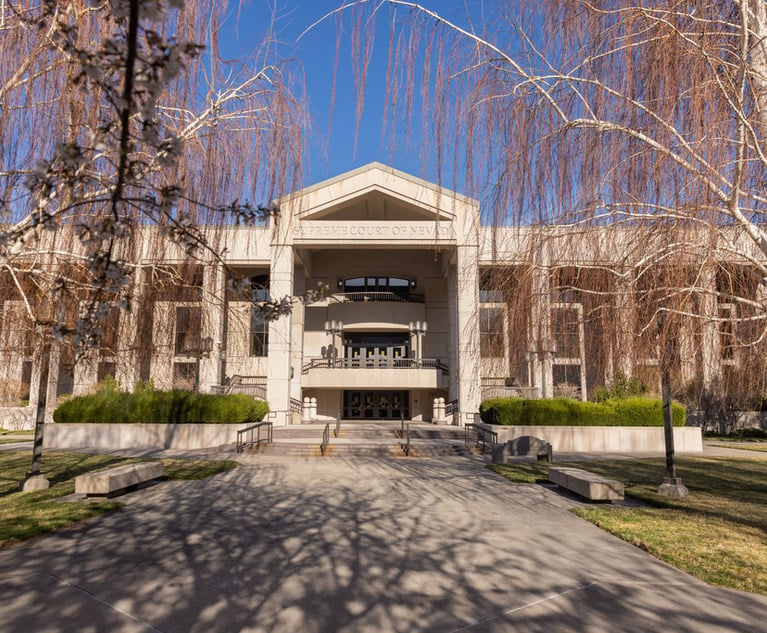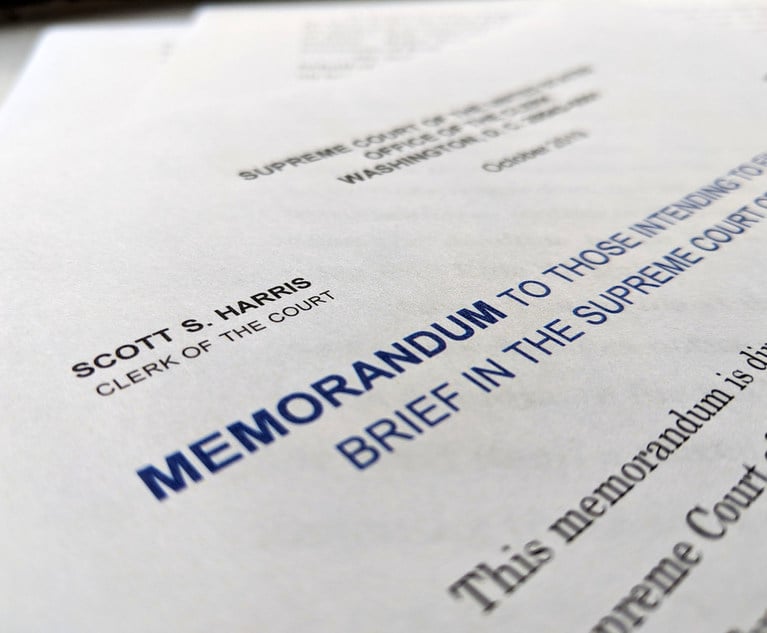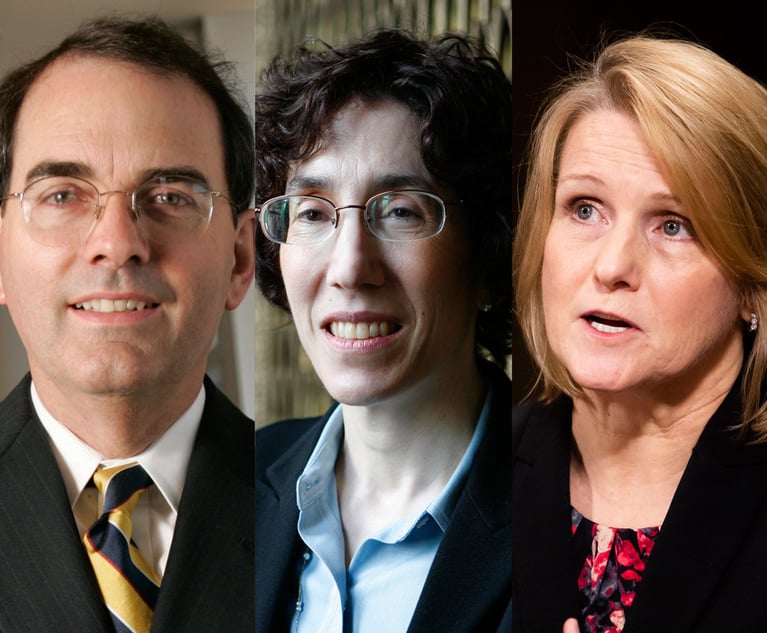 Justice Anthony Kennedy, testifying in 2007 about the Supreme Court's budget. (Photo by Diego M. Radzinschi / ALM)
Justice Anthony Kennedy, testifying in 2007 about the Supreme Court's budget. (Photo by Diego M. Radzinschi / ALM)Anthony Kennedy Walks Through His Secret Retirement Plans
In an interview with financier-philanthropist David Rubenstein released Wednesday, the former justice answers a range of questions about the Supreme Court, his early years as a lawyer in California and his future plans.
November 28, 2018 at 01:28 PM
6 minute read
Retired Justice Anthony Kennedy said in interview posted Wednesday that he chose to keep his retirement plans secret and set to a certain date, rather than making it contingent on confirmation of a successor, in order to keep the U.S. Senate's focus on a nominee's qualifications.
A retirement contingent on the confirmation of a successor was “not a good idea because the confirming authority knows there's no urgency,” Kennedy told David Rubenstein, the financier and philanthropist, in a recent interview at the University of Virginia School of Law.
“Some people might prefer the sitting judge to the judge nominated. I think they should be concentrated on the qualifications and temperament of the judge nominated and not have this other background consideration,” Kennedy said in his remarks.
On his retirement from the high court last summer, Kennedy said it was difficult to keep it secret as he balanced what he would ultimately do. But he did not reveal his plans to his colleagues until after the final conference of the term.
“Wednesday was the last conference day, and I made up my mind Tuesday night and told Mary (his wife),” he recalled. “I told my colleagues at the end of our final conference. I said you can't tell anyone until my appointment with the White House is over, which was about in an hour and a half. I talked to the White House Counsel and said it was important to see [the president] and they might have guessed. But they didn't tell the president who it was that was coming. I gave him the letter, and he was very gracious.”
In the interview with Rubenstein on Nov. 16 released Wednesday, Kennedy answered a broad range of questions about the Supreme Court, his early years as a lawyer in Sacramento and his future plans.
The “outcome” of his landmark same-sex marriage decision in 2015, Obergefell v. Hodges, “in a sense, it surprised me,” he said. “My religious beliefs, that was one of the reasons I wrote it.”
“I couldn't hide,” Kennedy added. “The nature of injustice is you can't see it in your own time. As I thought about it more and more, it seemed wrong to say over 100,000 adopted children of gay parents could not have their parents married. I struggled with it and wrote the case over the weekend. As you write, the reasons either compel themselves or not.”
When asked if, in the wake of the huge influx of money into elections, he had any regrets about his majority opinion in Citizens United v. FEC, he said the decision “stands for itself.”
“It's true there's a problem with money in politics, but I think we have to address it another way,” said Kennedy. He pointed to disclosure of the sources of the money. “Voters can vote against the candidate if they don't like it.”
Rubenstein asked Kennedy about his abortion decisions and refusal to overturn the landmark Roe v. Wade. “Our thinking is set forth in the opinions,” Kennedy responded. “We don't go around later explaining. We hope the opinions are convincing.”
The justices are very careful not to comment on the confirmation process, said Kennedy, and that was the case with the recent confirmations of Neil Gorsuch and Brett Kavanaugh, his former clerks. Kavanaugh was confirmed after a bruising confirmation at which he was accused of sexual misconduct. Kavanaugh denied the claims.
 Supreme Court nominee Brett Kavanaugh listens to the Senate Judiciary Committee on Capitol Hill on Sept. 4. (Photo: Jacquelyn Martin/AP)
Supreme Court nominee Brett Kavanaugh listens to the Senate Judiciary Committee on Capitol Hill on Sept. 4. (Photo: Jacquelyn Martin/AP)
“We had a rule that the minute someone whom we know—we had a Chinese wall—no communication,” he said. “Nor do we call clerks helping them—simply zero communications. We simply can't have the reality or perception the court is in any way involved in the nomination and confirmation of our own members. We kept absolute distance.”
Despite the intensely partisan nature of the Gorsuch and Kavanaugh confirmations, Kennedy said, “The public will very soon see the court is operating in a collegial, deliberative, thoughtful, inspiring way. Our conferences are being conducted with the greatest degree of collegiality. They'll see that in the opinions being written. They'll see the justices working well and with their colleagues.”
He noted that, of the roughly 8,000 petitions received each year, the justices discuss only about 500. On amicus briefs, he said, they try to read those in cases with “systemic importance.” The U.S. Chamber of Commerce, environmental groups, the ACLU, all help to inform the court about why a case is important. “If you say the court is being lobbied, that's rather dismissive of the court's function,” he said. “In a way, it's for the court to learn the systemic importance.”
Kennedy also rejected relying solely on the drafters' intent in interpreting the Constitution. “This is a written document. You can't just ignore the words written down. On the other hand, the words have to have meaning over time.”
He said he wasn't clear yet whether he would sit on other courts during his retirement. “I have writing to do and teaching,” he said. “The chief justice has other projects for me. I'm very interested in criminal justice and prison reform.”
On what he hopes the public would understand about the Supreme Court, Kennedy said: “I hope people would look at the court and realize it is not only possible but necessary for democracy to have civil rational discussion so we can plan our own destiny.The rest of the world is looking to see what democracy, what freedom, means. They see this hostile discourse.”
“[The court] is dedicated to finding what the law is, and the law has a moral foundation. Law is interested in the truth. This isn't a partisan exercise,” he said. “The work of freedom is never done.”
And he has had no second thoughts about leaving the high court. “None at all. It's hard to leave something you love, but you can do it if you do it for something you love more,” he said, indicating his wife and family. “Mary and I wanted to enjoy life in a different way.”
Read more:
This content has been archived. It is available through our partners, LexisNexis® and Bloomberg Law.
To view this content, please continue to their sites.
Not a Lexis Subscriber?
Subscribe Now
Not a Bloomberg Law Subscriber?
Subscribe Now
NOT FOR REPRINT
© 2024 ALM Global, LLC, All Rights Reserved. Request academic re-use from www.copyright.com. All other uses, submit a request to [email protected]. For more information visit Asset & Logo Licensing.
You Might Like
View All
Divided 5th Circuit Shoots Down Nasdaq Diversity Rules

Nevada Supreme Court to Decide Fate of Groundbreaking Contingency Cap Ballot Measure
5 minute read
Lawyers, Law Groups Oppose Proposal to Require Court Approval for Amicus Briefs

9th Circuit Judges Weigh if Section 230 Shields Grindr From Defective Design Claims
Trending Stories
- 1Call for Nominations: Elite Trial Lawyers 2025
- 2Senate Judiciary Dems Release Report on Supreme Court Ethics
- 3Senate Confirms Last 2 of Biden's California Judicial Nominees
- 4Morrison & Foerster Doles Out Year-End and Special Bonuses, Raises Base Compensation for Associates
- 5Tom Girardi to Surrender to Federal Authorities on Jan. 7
Who Got The Work
Michael G. Bongiorno, Andrew Scott Dulberg and Elizabeth E. Driscoll from Wilmer Cutler Pickering Hale and Dorr have stepped in to represent Symbotic Inc., an A.I.-enabled technology platform that focuses on increasing supply chain efficiency, and other defendants in a pending shareholder derivative lawsuit. The case, filed Oct. 2 in Massachusetts District Court by the Brown Law Firm on behalf of Stephen Austen, accuses certain officers and directors of misleading investors in regard to Symbotic's potential for margin growth by failing to disclose that the company was not equipped to timely deploy its systems or manage expenses through project delays. The case, assigned to U.S. District Judge Nathaniel M. Gorton, is 1:24-cv-12522, Austen v. Cohen et al.
Who Got The Work
Edmund Polubinski and Marie Killmond of Davis Polk & Wardwell have entered appearances for data platform software development company MongoDB and other defendants in a pending shareholder derivative lawsuit. The action, filed Oct. 7 in New York Southern District Court by the Brown Law Firm, accuses the company's directors and/or officers of falsely expressing confidence in the company’s restructuring of its sales incentive plan and downplaying the severity of decreases in its upfront commitments. The case is 1:24-cv-07594, Roy v. Ittycheria et al.
Who Got The Work
Amy O. Bruchs and Kurt F. Ellison of Michael Best & Friedrich have entered appearances for Epic Systems Corp. in a pending employment discrimination lawsuit. The suit was filed Sept. 7 in Wisconsin Western District Court by Levine Eisberner LLC and Siri & Glimstad on behalf of a project manager who claims that he was wrongfully terminated after applying for a religious exemption to the defendant's COVID-19 vaccine mandate. The case, assigned to U.S. Magistrate Judge Anita Marie Boor, is 3:24-cv-00630, Secker, Nathan v. Epic Systems Corporation.
Who Got The Work
David X. Sullivan, Thomas J. Finn and Gregory A. Hall from McCarter & English have entered appearances for Sunrun Installation Services in a pending civil rights lawsuit. The complaint was filed Sept. 4 in Connecticut District Court by attorney Robert M. Berke on behalf of former employee George Edward Steins, who was arrested and charged with employing an unregistered home improvement salesperson. The complaint alleges that had Sunrun informed the Connecticut Department of Consumer Protection that the plaintiff's employment had ended in 2017 and that he no longer held Sunrun's home improvement contractor license, he would not have been hit with charges, which were dismissed in May 2024. The case, assigned to U.S. District Judge Jeffrey A. Meyer, is 3:24-cv-01423, Steins v. Sunrun, Inc. et al.
Who Got The Work
Greenberg Traurig shareholder Joshua L. Raskin has entered an appearance for boohoo.com UK Ltd. in a pending patent infringement lawsuit. The suit, filed Sept. 3 in Texas Eastern District Court by Rozier Hardt McDonough on behalf of Alto Dynamics, asserts five patents related to an online shopping platform. The case, assigned to U.S. District Judge Rodney Gilstrap, is 2:24-cv-00719, Alto Dynamics, LLC v. boohoo.com UK Limited.
Featured Firms
Law Offices of Gary Martin Hays & Associates, P.C.
(470) 294-1674
Law Offices of Mark E. Salomone
(857) 444-6468
Smith & Hassler
(713) 739-1250










